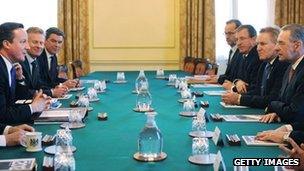London 2012: Olympic city ready to welcome the world, says IOC
- Published
London is ready to welcome the world, the head of the International Olympic Committee's inspection team has said.
Speaking as the IOC ended its final visit ahead of the 2012 Games, Denis Oswald said: "We can feel London is feeling the fever of the Games coming."
However he reminded organisers there was still a lot to do and they must remain focused.
The IOC delegation arrived in London on Wednesday for the 10th and last update on preparations for the Olympics.
Members of the inspection committee were greeted by a small group of anti-Dow protesters when they arrived for the coordination commission meeting in central London on Friday morning.
Seb Coe, chairman of the London organising committee, Locog, said he was willing to continue talks with the protesters in the run-up to the Games.
Ticket distribution
Inside the meeting Mr Oswald said the IOC was "totally satisfied" with London's ticketing arrangements and its overall plans to stage the Games.
"London presented us with a strong vision in Singapore seven years ago and, while many details will need to be finalised between now and 27 July, they are well on track to deliver an outstanding event," he said.
But the IOC's Gilbert Felli said lessons would be learned over the controversial ticket distribution system used by organisers Locog.
Games organisers have come in for heavy criticismfor refusing to provide details of how many tickets have been sold at what price for each event.

IOC delegates were given an update on preparations from the prime minister on Wednesday
Locog, who said 75% of Olympic tickets would be sold to the British public, has promised a complete breakdown will be provided once the sales process is completed.
Up to four million tickets are due to go on sale in the coming weeks but a breakdown and the exact amount of tickets that will be available are still being worked out.
London 2012 chief executive Paul Deighton said the tickets would go on sale after the draw for the football sessions, which will be made on 24 April.
But a busy schedule in the capital means a release date has yet to be finalised.
He said: "We have got test events, a command post exercise to test our command, control and communications systems. There is also a mayoral election.
"We just have to make sure that we fit the sale in around that so that it works as efficiently as possible."
'Legacy blueprint'
Meanwhile Locog said it was "strongly confident" the whole project would be brought in within budget and with no further call on the public purse.
The current budget of £9.3bn is almost four times the estimated cost of staging the Games at the time of the bid in 2005.
Lord Coe told the meeting that "testing now is absolutely crucial. There's a mountain of work to do, but we're in good shape".
Organisers also confirmed they were still working on creating an Olympic Park entry ticket system for people without tickets for sporting events.
After meeting the Prime Minister David Cameron earlier this week IOC president Jacques Rogge said the London Olympics had provided a "legacy blueprint" for future Games.
He said: "London has raised the bar on how to deliver a lasting legacy."
Mr Cameron assured the IOC that promises on security and transport and a lasting legacy would be delivered at what would be "the greatest show on Earth".
Dow, which is sponsoring a fabric wrap around the Olympic Stadium, has been at the centre of a row over its links to the firm that ran the Bhopal pesticide plant - the site of one of the world's worst industrial disasters in December 1984.
Campaigners say the chemical gas leak in Bhopal and its fallout have killed 25,000 people, and that local people continue to be affected.
Rights groups, athletes and Indian and British politicians have called for the company's sponsorship to be shelved.
But Dow maintains Union Carbide's £288m ($470m) settlement for those affected by the tragedy - which was paid in 1989 -was fair and final.
- Published28 March 2012
- Published23 January 2012